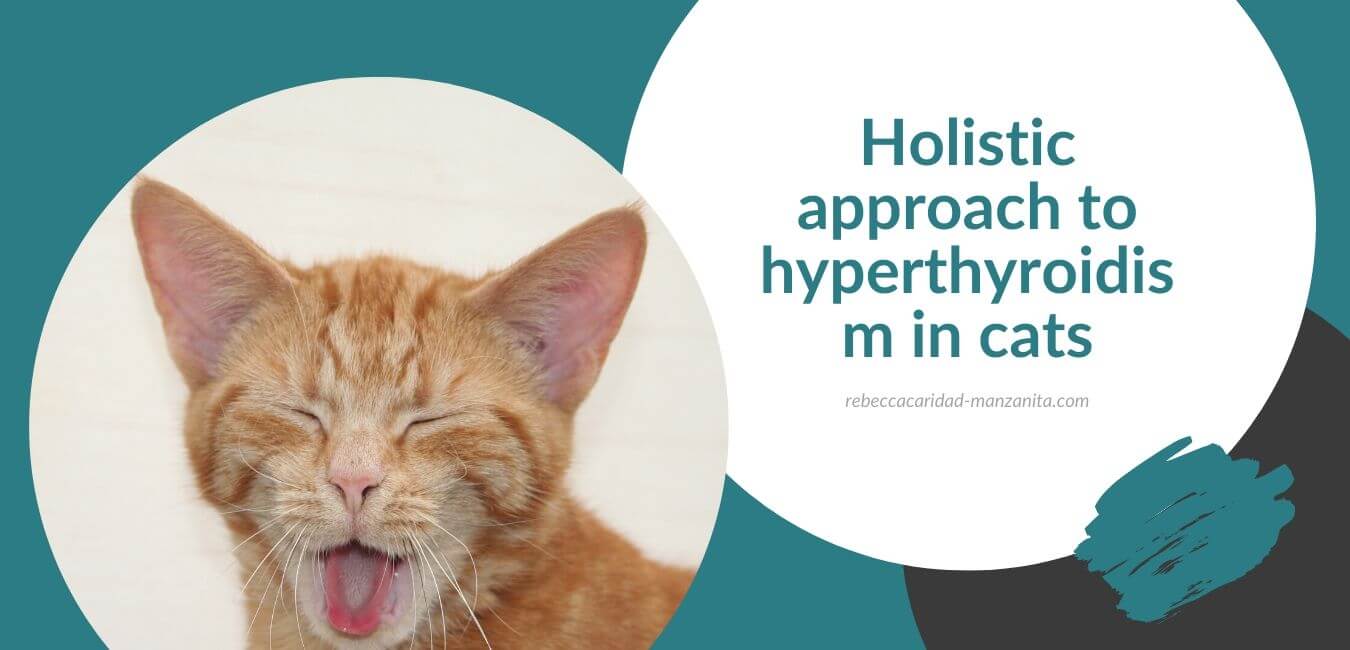Holistic approach to hyperthyroidism in cats – Sudden weight loss, personality change, or other behavior changes in a cat who is still eating can be quite puzzling. Blood work will determine if your kitty’s thyroid gland is over-functioning.
The normal western (allopathic) approach to hyperthyroidism is a suppression of the gland’s hormone production, either through medication or radioactive iodine treatment. Holistic medicine looks at the whole kitty – to determine the underlying reason for hyperthyroidism and treat the root of the problem.
Do feed a species-appropriate diet
As almost pure carnivores, cats need to eat meat. Meat is protein and in the natural state, it has a lot of moisture. When commercial food was invented, cats had health issues related to taurine deficiency. Taurine comes from meat.
Commercial food can have a meat deficiency, thus cats develop taurine deficiency. Cats that are fed meat won’t have a problem with insufficient taurine in the diet. Healthy food is the heart of all holistic treatment.
Do make sure there is a natural source of beta-carotene in the food
Hyperthyroid patients have a hard time converting beta-carotene to Vitamin A – natural sources will be easier for the body to convert. And natural vitamins are more readily absorbed than synthetic vitamins.
Cats will eat very small amounts of the following vitamin A/carotene-rich foods: spirulina, barley grass, chlorella, carrot, sweet potato, kale, and spinach. These ingredients should be less than 10 percent of a kitty’s meal – mix well into your cat’s food.
Do tonify yin
Yin is the body’s cooling capacity. Many hyperthyroid cats have burned up their yin from inflammation; often from the inappropriate diet, over-vaccination, and overuse of allopathic medication.
Because cats are carnivorous, yin tonifying meats are a great way to strengthen yin and cool the body. Try beef, liver, pork, turkey, duck, freshwater clams, and mussels.
Do consider herbal therapy, acupuncture, homeopathy, and other alternative therapies
The trickiest part of treating cats is discovering what the cat will let you do. Some cats won’t tolerate any oral medication. This makes typical allopathic (western) and herbal medications difficult. Some cats won’t tolerate acupuncture needles. Some cats are so easygoing that anything is game.
For any holistic therapy, the more information about your kitty’s history you can provide the better the treatment will be. All alternative treatment methods look at the totality of the patient – not just the fact that Kitty has hyperthyroidism.
Allopathic medicine treats all hyperthyroid patients the same. Alternative medicine looks at each patient and treats the whole patient, not just the disease.
Do not feed seafood, salty foods, or chlorinated/fluorinated water
Seafood is high in iodine, which can unbalance the thyroid gland. The same thing for salt – read that bag of kibble – salt is added for trace minerals.
And water? Chlorine and/or fluorine are similar to iodine and may irritate the thyroid gland even more. Instead, spring water is one of the best water sources to give your cat.
Do not feed dry kibble or food based on grains, carbohydrates or containing by-products, dyes or sugar
These foods are not natural for cats to eat and can worsen hyperthyroidism – they may actually have contributed to the problem in the first place.
Cats are carnivores and should be fed a carnivorous diet. Grain, sugar, and carbohydrates stimulate the nervous system into over-activity – the nervous system connects to the thyroid gland and causes over-function as well.
Do not expect overnight miracles
Hyperthyroidism took years to develop, it will take time to regulate, regardless of using regular medication or alternative treatments.
The beauty of the holistic treatment is it treats the underlying cause of disease. In this case, by getting to the root of the hyperthyroid, even if the disease cannot be reversed, its effects can be lessened through a better-balanced body.
Summary
Once you’ve found out your precious cat has hyperthyroidism, look to the root cause; look to treat the underlying disease process so the treatment will go better. Finding the underlying cause is the goal of holistic therapy.
Treat the root of the problem and have a better response to treatment. While hyperthyroidism can’t always be reversed, its effects can be minimized for the longer good health of your cat.

